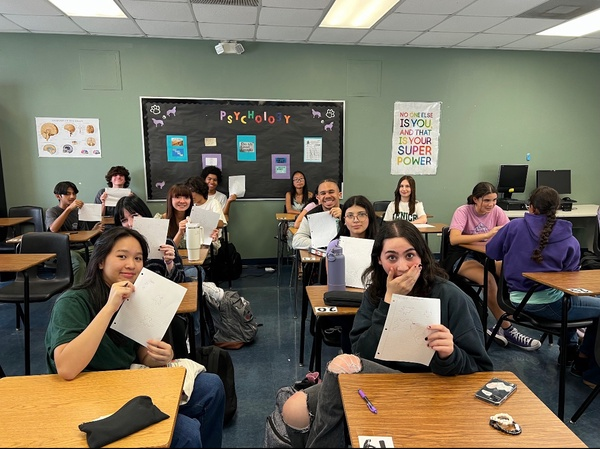Psych Club is committing itself to Alzheimer’s Awareness Month!
By Sebastian Lausell
Alzheimer’s disease is the most common form of dementia, destroying memory and other mental functions. It’s a progressive disease and gets worse as you get older. While there is treatment for the disease, there is no cure. It’s a chronic disease and can affect someone for their entire life. Alzheimer’s affects more than 6 million Americans, and more than 6.7 million Americans 65 or older are affected by Alzheimer’s. It is a horrible disease that tears apart families and erases precious memories of those afflicted by it. Psychology Club’s main goal for the month is to show support to the victims of Alzheimer’s disease and engage in activities to help prevent & defeat Alzheimer’s.
Recently, Psychology Club has centered most of its meetings on activities that involve memory and bringing awareness to the cause. For example, in the first meeting of this month, they created letter-beaded bracelets saying things like “END ALZ”, STOP ALZ”, and “STOP THE STIGMA.” A lot of harmful stigmas are made about Alzheimer’s, and a lot of the time a narrative is created dubbing those who have it as “dangerous.” As a result, this causes family members and friends to withdraw from said person; it also causes the person to be afraid to seek treatment for fear of being misunderstood. This can cause that person’s condition to deteriorate and could harm them in many ways. Also, this stigma contributes to institutionalization as many who have Alzheimer’s may be afraid to seek help for fear of being institutionalized. But, in the end, if they don’t seek the proper treatment their chances of institutionalization increase exceptionally. In reality, anyone can get Alzheimer’s regardless of mental well-being. If all this harm is caused by one stigma, imagine how much harm other stigmas have on those suffering from Alzheimer’s. This is a key reason why it’s important to show support to those afflicted by this horrible disease. But obviously, Alzheimer’s has met their match, Psychology Club.
To add to this great deed, Psychology Club is helping to stop Alzheimer’s by finding ways to prevent it. Since Alzheimer’s causes loss of memory, a way Psychology Club is helping to prevent it is by creating memory games to help build a strong memory and mind. This way, Alzheimer’s won’t be able to get into the brains of so many. Sophomore Kaylee Guinigundo stated, “We played memory games to test students’ memories and abilities to recall a short image. Playing memory games can strengthen your mental capacity, as well as prevent cognitive diseases like Alzheimer’s or dementia. On October 7th, club members have the option to participate in the Walk to End Alzheimer’s, where they can earn service hours by supporting Alzheimer’s patients by walking with them to help spread awareness. The month of September is Alzheimer’s Awareness Month. Psychology Club also studies different psychological topics each month to spread the knowledge to all. We encourage new members to join us in fun activities that study the psychological aspects of life, and will always welcome people into our club!” This walk to end Alzheimer’s not only helps to spread awareness about the disease but also helps to defeat it. By participating, you are fueling the engine that works towards ending Alzheimer’s.
Even though you’re just walking, you’re also bringing awareness to the cause. By promoting the event, you may inspire others to join. Also, you’re able to donate money which goes to Alzheimer’s patients and research towards ending Alzheimer’s. By walking we are showing not only our community, but the world that we care, and this attention will drive conversations all over about how to end Alzheimer’s.
In all, Psychology Club is leaving a positive imprint on our school and community overall by bringing so much attention to Alzheimer’s this month. Their dedication to finding ways to prevent and bring awareness to the disease is very admirable and is a great example of how to bring awareness to the cause. Hopefully, in the future activism like this will lead to a brighter, more positive world. A world without Alzheimer’s.
